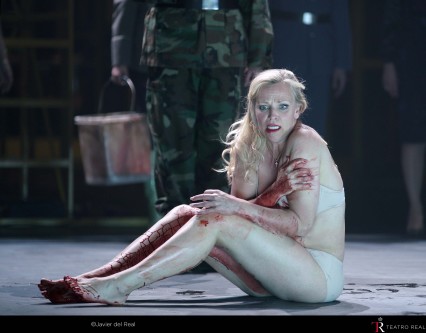 Spain Zimmermann, Die Soldaten: Teatro Real Chorus and Orchestra / Pablo Heras Casado (conductor), Teatro Real, Madrid, 28.5.2018. (JMI)
Spain Zimmermann, Die Soldaten: Teatro Real Chorus and Orchestra / Pablo Heras Casado (conductor), Teatro Real, Madrid, 28.5.2018. (JMI)

Cast:
Marie Wesener – Susanne Elmark
Stolzius – Leigh Melrose
Desportes – Martin Koch
Wesener – Pavel Daniluk
Captain Mary – Wolfgang Newerla
Charlotte – Julia Riley
Wesener’s Old Mother – Hanna Schwarz
Stolzius’s Mother – Iris Vermilion
Captain Pirzel – Nicky Spence
Padre Eisenhardt – Germán Olvera
Captain Haudy – Rafael Fingerlos
Young Count – Antonio Lozano
Countess de la Roche – Noëmi Nadelmann
Production:
Direction – Calixto Bieito (original), Barbora Horáková (revival)
Sets – Rebecca Ringst
Costumes – Ingo Krügler
Lighting – Franck Evin
Videos – Sarah Derendinger
This opera, the only one written by German composer Bernd Alois Zimmermann (1918-1970), ranks among the most important operas from the second part of the twentieth century. Commissioned by the Cologne Opera, the work was to have had its premiere in 1963, but those in charge of the theatre considered the opera impossible to perform because of the complexities that it presented. Zimmermann then introduced various changes, and the premiere finally took place in Cologne in February 1965.
It was very well received by the public, but there have not been many opportunities to see it since then. Even with Zimmermann’s changes, there are still enormous musical difficulties, and only very well-prepared opera houses can deal with them. It requires a huge orchestra of more than 125 musicians and features an important percussion section. This is a modern work in which melody does not prevail, but it has a spectacular orchestration and an exceptional dramatic charge in the score. It will not be easy to mount the opera here again, and one should thank Teatro Real for the opportunity given us to get to know it: this was in fact the Spanish premiere.
This Calixto Bieito production premiered in Zurich in 2013 and could be seen at Berlin’s Komische Oper in 2014. The orchestra is placed on the stage, but elevated, with the bottom part of the stage reserved for the singers. The characters (and eventually part of the percussion section) enter and leave through a kind of tunnel below the metal scaffolding that holds the orchestra. The action, set at the time of the opera’s composition, focuses on the figure of Marie, her relations with the officers of the regiment in Lille, and her inexorable march towards personal ruin. In fact, all the musicians, including the conductor, are dressed as soldiers. The lighting is not particularly bright, and video projections take on a prominent role.
Barbora Horáková handled the staging for the Madrid revival. The direction of the singers is good overall, but there are some excesses. For my taste, the most gratuitous detail of the production is the incestuous relationship of the Countess de la Roche and her son, the young Count. This adds nothing to the telling and seems to be there only to provoke the audience.
The musical direction was entrusted to Pablo Heras Casado, although one could say that there were two conductors. Heras Casado, given his elevated position at the rear of the stage, could lead the orchestra but had his back to where the action was taking place. It fell to an assistant, Vladimir Junyent, to direct all the singers. Both deserve praise for the work they did. In musical terms, Pablo Heras Casado was brilliant from beginning to end, and the orchestra gave a great performance.
The main protagonist, Marie Wesener, was played by soprano Susanne Elmark, who was superb. She can cope with the difficult tessitura and is a terrific actress who made this complicated character credible.
The role of Stolzius, her former fiancé, was sung by baritone Leigh Melrose, who exhibited a powerful voice and good acting skills. Desportes, the officer who takes advantage of the unfortunate Marie, was interpreted by tenor Martin Koch. I found him more impressive as an actor than a singer: he gets too tight with the tessitura.
Bass Pavel Daniluk in the part of Wesener, Marie’s father, has a strong and attractive voice, and he sang convincingly, especially in the final scene. Baritone Wolfgang Newerla did well as Captain Mary, the new officer who takes advantage of Marie, while tenor Antonio Lozano was correct as the young Count.
Julia Riley, Nicky Spence, Rafael Fingerlos and Iris Vermilion all did well in their roles. It was a pleasure for me to see on stage once again veteran Hanna Schwarz as Wesener’s mother.
José M. Irurzun

Thank you!
I would love to see this opera ‘Die Soldaten’. Do you you know if one can see it somewhere during the season 2018/19?
Best Regards